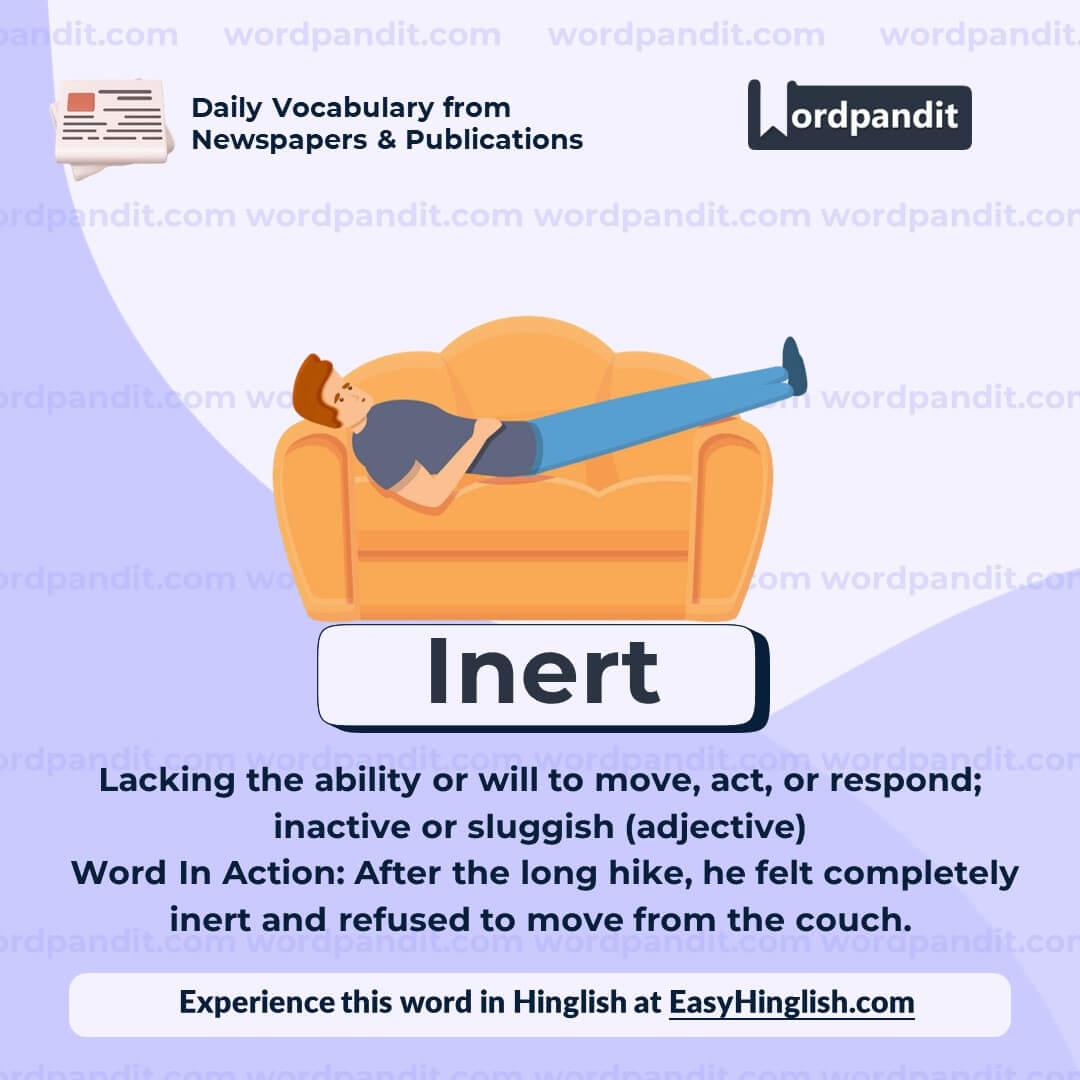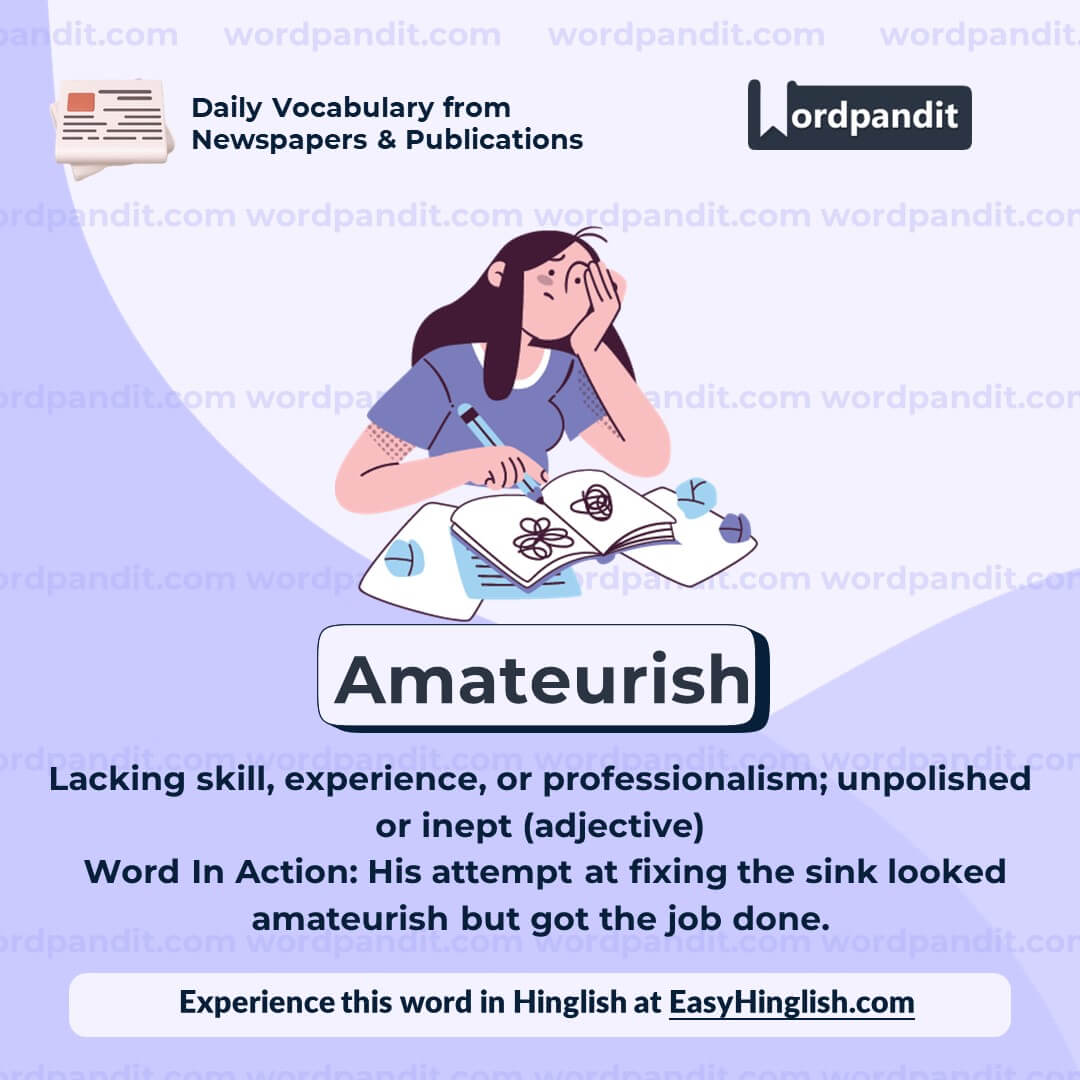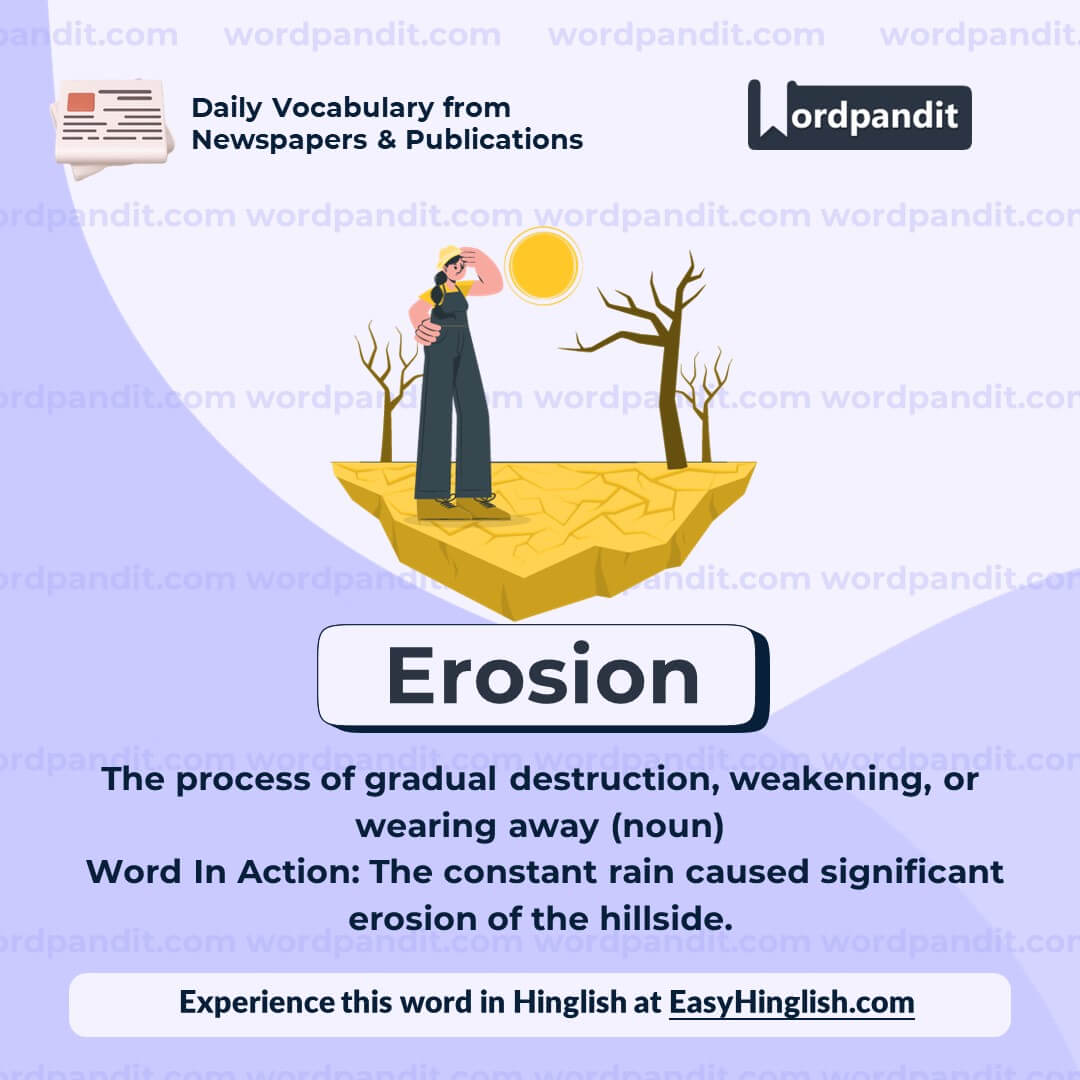Daily Vocabulary from Indian Newspapers and Publications
Welcome to Wordpandit’s Indian Vocabulary Hub
At Wordpandit, we understand the importance of staying rooted in the local context while expanding your language skills. This section focuses on enriching your vocabulary with words and phrases drawn from India’s leading newspapers and publications, ensuring you're learning vocabulary that is practical, relevant, and uniquely Indian.
Why Indian Sources Matter
We believe that the best way to master any language is by immersing yourself in local content. That’s why we carefully curate vocabulary from top Indian publications, including:
- The Hindu
- The Times of India
- The Economic Times
- Hindustan Times
- Live Mint
- The Indian Express
- And many others...
Stay Updated, Stay Relevant
With daily updates from Indian news sources, you’ll be consistently learning words that reflect the trends and shifts in Indian society and culture. Our focus is to provide vocabulary that enhances your understanding of the language in an Indian context.
How Wordpandit Supports Your Goals
Whether you’re preparing for exams, aiming to improve your professional communication, or simply want to stay connected with the latest Indian vocabulary, Wordpandit is here to guide you every step of the way.
Learn with a Practical Approach
Our interactive learning methodology includes real-world examples, engaging activities, and context-specific usage to ensure that every word becomes part of your active vocabulary.
Dive into Indian Vocabulary Today!
Why Choose Wordpandit?
Practical Learning: Focus on words you'll actually encounter in real-world reading, enhancing your comprehension and communication skills.
Diverse Content: From current affairs to scientific breakthroughs, our varied sources expose you to vocabulary across multiple domains.
Effortless Integration: Make Wordpandit a part of your daily routine. Just a few minutes each day can significantly boost your lexicon over time.
Your Path to Vocabulary Mastery
- Visit our Daily Vocabulary section regularly
- Explore new words and their usage in context
- Practice incorporating these words into your own writing and speech
- Track your progress as your vocabulary expands
Start Your Journey Today
Embark on your vocabulary enhancement journey with Wordpandit. By consistently engaging with our daily posts, you'll build a robust vocabulary that serves you well in academic, professional, and personal contexts.
Remember, a word a day keeps linguistic limitations at bay. Make Wordpandit your daily companion in the quest for vocabulary excellence!
WORD-1: Inert
Context:
"Remains a country that’s highly reactive and rarely proactive, whose policy makers remain inert until a catastrophe occurs. While retributive justice has its place, it serves merely as symptomatic treatment, failing to address root causes." - The Wire
Explanatory Paragraph:
The word "inert" describes a state of inactivity or lack of action, especially when action is expected or necessary. It often implies an inability or unwillingness to move or respond, whether due to physical, mental, or political stagnation. In the context provided, it highlights policymakers' reluctance to take proactive measures.
Meaning: Lacking the ability or will to move, act, or respond; inactive or sluggish (adjective)
Pronunciation: in-URT
Difficulty Level: ⭐⭐ Beginner to Intermediate
Etymology: From Latin "iners," meaning "unskilled" or "idle," derived from "in-" (not) + "ars" (skill or art).
Synonyms & Antonyms:
Synonyms: inactive, idle, dormant, immobile, stagnant
Antonyms: active, dynamic, energetic, responsive
Usage Examples:
- The new policy remained inert for months, awaiting the legislature's approval.
- The chemical was inert and did not react with any of the substances in the experiment.
- Her inert demeanor in the meeting made it clear she had no interest in the discussion.
- After the storm, the once-bustling town appeared eerily inert.
Cultural Reference:
"Inert gases," also known as noble gases, are a group of elements that do not readily form chemical reactions due to their full valence electron shells. This scientific term is derived from the same root, emphasizing inactivity or lack of reactivity.
Think About It:
How might the inert attitudes of policymakers contribute to systemic issues in a society?
Quick Activity:
Write a sentence describing a situation where being inert could lead to negative consequences. Share it with a friend or classmate for feedback.
Memory Tip:
Imagine an "inert" car stuck in traffic, not moving an inch. The car’s inactivity is like the meaning of the word!
Real-World Application:
The term "inert" is often used in scientific contexts, such as describing inert gases, but it is also applied metaphorically in everyday language to describe people, policies, or systems that fail to act when action is needed.
WORD-2: Acquitting
Context:
"Sanap gave the ruling while acquitting two boys who were convicted for stalking a minor girl by following her." - The Wire
Explanatory Paragraph:
The word "acquitting" refers to the legal act of declaring someone not guilty of a crime, typically through a formal judicial process. It implies that after examining the evidence, the person is freed from any charges or convictions. In the context provided, it highlights a legal decision to free the two boys from the charges of stalking.
Meaning: To formally declare someone not guilty of a crime or wrongdoing (verb)
Pronunciation: uh-KWIT-ing
Difficulty Level: ⭐⭐⭐ Intermediate
Etymology: From Old French "acquiter," meaning "to settle a debt or obligation," derived from Latin "ad-" (to) + "quietare" (to set free).
Synonyms & Antonyms:
Synonyms: exonerating, absolving, clearing, discharging
Antonyms: convicting, condemning, charging
Usage Examples:
- The jury took only an hour to deliberate before acquitting the defendant of all charges.
- The evidence presented in court played a critical role in acquitting the accused.
- Despite the public outrage, the judge had no choice but to focus on the facts and issue an acquitting verdict.
- The lawyer celebrated the news of her client’s acquitting ruling with the legal team.
Cultural Reference:
The term "acquitting" gained global attention during high-profile trials such as the O.J. Simpson case, where the defendant was acquitted of murder charges, sparking widespread debate on the judicial system's fairness.
Think About It:
How does the act of acquitting an individual impact the public perception of the justice system?
Quick Activity:
Research a famous case where an individual was acquitted. Write a brief paragraph discussing whether you agree or disagree with the ruling and why.
Memory Tip:
To remember "acquitting," think of "quit" in the middle of the word, signifying that the charges are "quitted" or dropped!
Real-World Application:
The term "acquitting" is essential in law and media discussions, often used to describe the resolution of criminal trials. Understanding its meaning helps clarify news reports on court rulings and their implications.
WORD-3: Amateurish
Context:
"Replacement of the iconic 1971 war surrender painting in the Chief of Army Staff’s lounge by an amateurish mishmash is a matter of concern for one big reason – the complete erosion of Indian Army’s professionalism." - The Wire
Explanatory Paragraph:
The word "amateurish" refers to something that is done in an unskilled or inept way, often lacking the polish or expertise expected from a professional. It is typically used to describe work that appears inexperienced, haphazard, or poorly executed. In the context provided, it criticizes the replacement painting as lacking the artistic professionalism of the original.
Meaning: Lacking skill, experience, or professionalism; unpolished or inept (adjective)
Pronunciation: AM-uh-tur-ish
Difficulty Level: ⭐⭐ Intermediate
Etymology: Derived from French "amateur," meaning "lover of," based on Latin "amator" (lover) and "amare" (to love). Initially referred to a non-professional who pursued an activity out of love, later acquiring a negative connotation of lack of skill.
Synonyms & Antonyms:
Synonyms: unskilled, clumsy, inept, crude, unprofessional
Antonyms: professional, skilled, polished, expert, proficient
Usage Examples:
- The design looked amateurish, as if it had been thrown together at the last minute.
- Her first attempt at painting was amateurish, but she showed promise with a bit of guidance.
- The report’s formatting appeared amateurish, detracting from the otherwise valuable content.
- The chef criticized the dish as amateurish, pointing out its lack of seasoning and poor presentation.
Cultural Reference:
In the world of cinema, amateurish filmmaking often refers to poorly executed movies with shaky camerawork or unconvincing acting, which is common in low-budget or beginner projects.
Think About It:
Can amateurish work ever have charm or value, especially in creative fields?
Quick Activity:
Look at two paintings or pieces of work, one professional and one amateurish. Identify the differences and write a short paragraph describing them.
Memory Tip:
To remember "amateurish," think of "amateur" combined with "-ish," which makes it sound like "kind of amateur." This reflects its meaning of lacking polish or professionalism.
Real-World Application:
The term "amateurish" is widely used in critical reviews of art, writing, presentations, and performances. Recognizing amateurish traits can help in self-improvement and understanding the value of professional standards.
WORD-4: Erosion
Context:
"Replacement of the iconic 1971 war surrender painting in the Chief of Army Staff’s lounge by an amateurish mishmash is a matter of concern for one big reason – the complete erosion of Indian Army’s professionalism." - The Wire
Explanatory Paragraph:
The word "erosion" refers to the gradual destruction, weakening, or diminishing of something, often due to consistent or prolonged external forces. While it is commonly used in geological contexts to describe the wearing away of soil or rock, it is frequently applied metaphorically to describe the decline of values, institutions, or relationships. In this context, it highlights the perceived weakening of professionalism in the Indian Army.
Meaning: The process of gradual destruction, weakening, or wearing away (noun)
Pronunciation: ih-ROH-zhun
Difficulty Level: ⭐⭐ Intermediate
Etymology: From Latin "erosionem," meaning "a gnawing away," derived from "erodere" (to gnaw out), from "e-" (out) + "rodere" (to gnaw).
Synonyms & Antonyms:
Synonyms: deterioration, decay, disintegration, depletion, weakening
Antonyms: growth, strengthening, restoration, buildup
Usage Examples:
- Constant exposure to the elements led to the gradual erosion of the cliff face.
- The erosion of trust between the two nations made negotiations increasingly difficult.
- The company faced criticism for the erosion of workers' rights under the new policies.
- Unchecked corruption has caused the erosion of public confidence in the government.
Cultural Reference:
Soil erosion, a significant environmental issue, is often highlighted in literature and films like "The Man Who Planted Trees," emphasizing the need for ecological conservation to prevent long-term damage.
Think About It:
What steps can individuals and societies take to prevent the erosion of values and principles over time?
Quick Activity:
Identify an area in your community where you observe either physical erosion (e.g., soil, structures) or metaphorical erosion (e.g., values, relationships). Write a short note on how it can be addressed.
Memory Tip:
Think of "erosion" as something that is "eaten away" slowly over time, like a cookie left out in the rain!
Real-World Application:
Understanding erosion is crucial in diverse fields such as environmental science, urban planning, and social commentary. It helps in identifying and addressing gradual declines in both physical and metaphorical contexts.
WORD-5: Endeavour
Context:
"New painting is perhaps a product of Project Udbhav, which is a collaborative endeavour of the Indian Army and the United Services Institution of India, seeking to ‘integrate age-old wisdom with contemporary military pedagogy.’" - The Wire
Explanatory Paragraph:
The word "endeavour" refers to a serious or determined effort to achieve a goal, often involving collaboration or dedication. It conveys a sense of purpose and intent, typically in the pursuit of a challenging or meaningful objective. In this context, it describes a joint effort by organizations to blend traditional wisdom with modern military practices.
Meaning: A serious effort or attempt to achieve something (noun); to try hard to do or achieve something (verb)
Pronunciation: en-DEV-ur
Difficulty Level: ⭐⭐ Intermediate
Etymology: From Middle English "endever," meaning "to exert oneself," based on Old French "en deveir," meaning "to make it one's duty."
Synonyms & Antonyms:
Synonyms: effort, attempt, undertaking, venture, pursuit
Antonyms: idleness, inactivity, negligence, apathy
Usage Examples:
- The team’s endeavour to climb the mountain despite harsh weather was inspiring.
- Project Udbhav is an endeavour to merge ancient knowledge with modern techniques.
- She worked tirelessly in her endeavour to bring educational reforms to her community.
- The scientific endeavour to discover a cure for rare diseases requires global cooperation.
Cultural Reference:
The Space Shuttle Endeavour, named after the British HMS Endeavour, symbolizes human curiosity and the relentless pursuit of exploration, showcasing the importance of collective effort in advancing science and technology.
Think About It:
Why is collaboration often crucial for the success of large-scale endeavours?
Quick Activity:
Write about a personal endeavour that you undertook recently. What challenges did you face, and how did you overcome them?
Memory Tip:
Remember "endeavour" by linking it to "end" and "ever"—the effort you put in lasts "ever" until you achieve the "end" goal.
Real-World Application:
The term "endeavour" is often used in professional, academic, and personal contexts to emphasize the effort and determination required to accomplish significant tasks or goals.


















